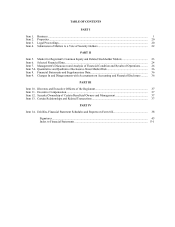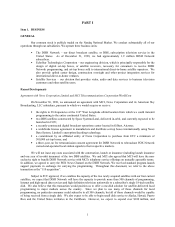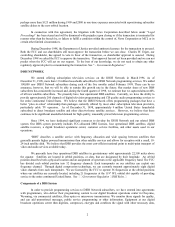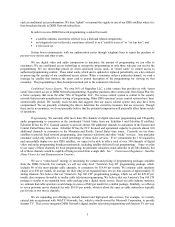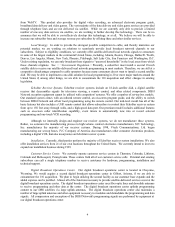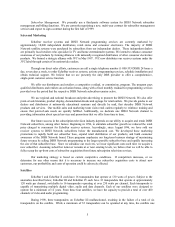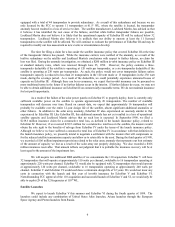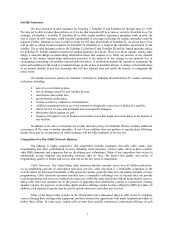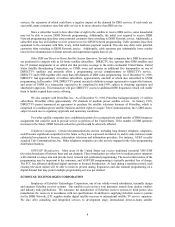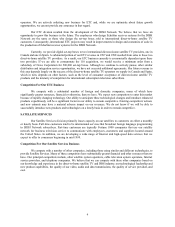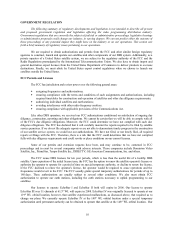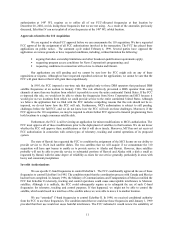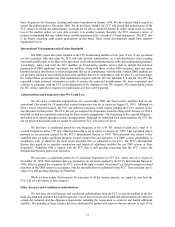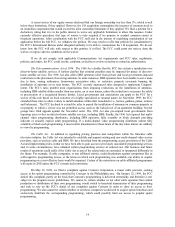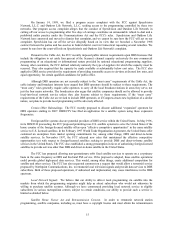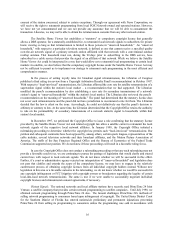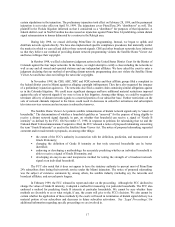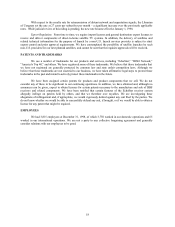Dish Network 1998 Annual Report Download - page 12
Download and view the complete annual report
Please find page 12 of the 1998 Dish Network annual report below. You can navigate through the pages in the report by either clicking on the pages listed below, or by using the keyword search tool below to find specific information within the annual report.10
GOVERNMENT REGULATION
The following summary of regulatory developments and legislation is not intended to describe all present
and proposed government regulation and legislation affecting the video programming distribution industry.
Government regulations that are currently the subject of judicial or administrative proceedings, legislative hearings
or administrative proposals could change our industry, in varying degrees. We can not predict either the outcome of
these proceedings or any potential impact they might have on the industry or on our operations. This section sets
forth a brief summary of regulatory issues pertaining to our operations.
We are required to obtain authorizations and permits from the FCC and other similar foreign regulatory
agencies to construct, launch and operate our satellites and other components of our DBS system. Additionally, as a
private operator of a United States satellite system, we are subject to the regulatory authority of the FCC and the
Radio Regulations promulgated by the International Telecommunication Union. We also have to obtain import and
general destination export licenses from the United States Department of Commerce to deliver products to overseas
destinations. Finally, we must abide by United States export control regulations when we choose to launch our
satellites outside the United States.
FCC Permits and Licenses
The FCC has jurisdiction and review power over the following general areas:
• assigning frequencies and authorizations;
• ensuring compliance with the terms and conditions of such assignments and authorizations, including
required timetables for construction and operation of satellites and other due diligence requirements;
• authorizing individual satellites and earth stations;
• avoiding interference with other radio frequency emitters;
• ensuring compliance with applicable provisions of the Communications Act.
Like other DBS operators, we received our FCC authorizations conditioned on satisfaction of ongoing due
diligence, construction, reporting and other obligations. We cannot be certain that we will be able to comply with all
of the FCC’s due diligence obligations. Moreover, the FCC could determine we have not complied with such due
diligence obligations. The FCC has declared that it will carefully monitor the reports required to be filed by satellite
service permitees. If we do not file adequate reports or are not able to demonstrate timely progress in the construction
of our satellite service system, we could lose our authorizations. We have not filed, or not timely filed, all required
reports or filings with the FCC. Therefore, there is a risk that the FCC could determine that we have not complied
fully with due diligence requirements and could revoke or place conditions on our current licenses.
Some of our permits and extension requests have been, and may continue to be, contested in FCC
proceedings and in court by several companies with adverse interests. Those companies include Dominion Video
Satellite, Inc., PrimeStar, Tempo Satellite Inc., DIRECTV, GE American Communications, Inc. and others.
The FCC issues DBS licenses for ten year periods, which is less than the useful life of a healthy DBS
satellite. Upon expiration of the initial license term, the FCC has the option to renew the satellite operator’s license or
authorize the operator to operate for a period of time on special temporary authority, or decline to renew the license.
If the FCC declined to renew the operator’s license, the operator would be required to cease operations and the
frequencies would revert to the FCC. The FCC usually grants special temporary authorizations for periods of up to
180 days. These authorizations are usually subject to several other conditions. We also must obtain FCC
authorization to operate our earth stations, including the earth stations necessary to uplink programming to our
satellites.
Our licenses to operate EchoStar I and EchoStar II both will expire in 2006. Our license to operate
EchoStar III over 11 channels at 61.5° WL will expire in 2008. EchoStar IV was originally licensed to operate at our
119° WL orbital location, however, that satellite experienced malfunctions, as discussed above, that required us to
change our plans. We currently operate EchoStar IV at the 148° WL orbital location under a special temporary
authorization until permanent authority can be obtained to operate that satellite at the 148° WL orbital location. Our


